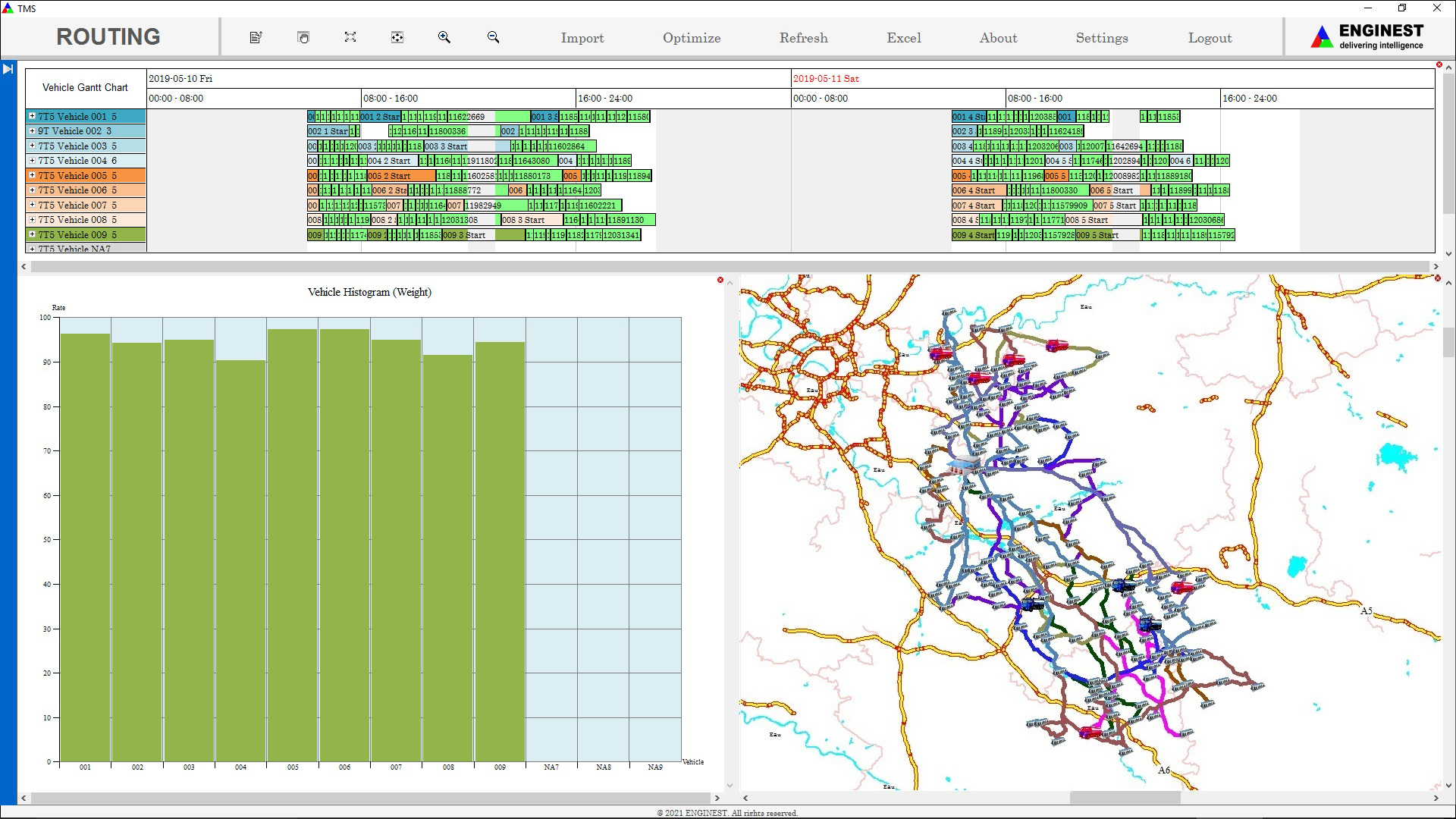Planning and scheduling with Enginest's mathematical language
Date:
Changed on 01/10/2021

My language is expressive, it is easy to read and write. It is operational, it is active. I, Enginest, propose Programming in Operational and Expressive Models, a POEM. This is the name of a platform that provides mathematical solutions for clients to optimise their resources. By this, I mean companies looking for software that can create schedules for their staff, plan the routes of their deliveries, minimise production times or better plan tasks. My founder Jianyang Zhou says it this way: “POEM is the heart of Enginest, it is an optimisation engine which uses the NCL language to manage, plan and schedule.” Logistics is a well-known mathematical challenge, popularised in particular as the "Travelling Salesman Problem", an optimisation problem to determine the shortest route between cities in a list that must all be visited once by an imaginary traveller. This is called an “NP-hard problem”, a mathematical term for the challenges posed to algorithms whose solution time increases exponentially with the increase in the amount of input data (the number of cities to be visited, for example). Such levels of complexity are common and are solved daily by approximations, or “good” solutions, whereas an optimal solution is often impossible to calculate quickly. In my offices my engineers are working on improving the POEM platform and using it to deal with the many NP-hard problems encountered by industry and to get as close as possible to an optimal level of efficiency.
Verbatim
Enginest provides a high-quality service, is very responsive and meets expectations. Our needs and constraints (transport costs, a diverse customer portfolio, operating requirements) require programming algorithms based on a sophisticated mathematical logic. Thanks to the Enginest system, we have optimised our costs by about 20%, in particular by centralising and automating the construction of routes. POEM's algorithms have enabled us to reduce the number of kilometres travelled by 30% and to improve our delivery times while reducing our costs.
Auteur
Poste
The logistics applications manager at Antargaz Energies, that has been a customer for over twenty years
I was created in 2000 in Nancy at the Inria premises. In 1997, Jiangyang Zhou, who had just defended a computer science thesis at the University of Aix-Marseille, was recruited for a post-doctorate. He continued working on the issues studied during his thesis, looking at industrial applications, and published articles on topics such as gas transport logistics or route planning for vehicles transporting people with disabilities. In 2000, NCL was publicly launched in the prestigious Journal of Logic Programming. An article entitled “Introduction to the constraint language NCL” presented the basis of a project that my founder has continued to work on until today. “I had the honour of working on a thesis directed by Alain Colmerauer, professor known for Prolog. With him, I discovered a new and elegant form of language called logic programming” recalls Jianyang Zhou. The first version of Prolog was developed in 1972 and it was a crucial moment in the history of logic programming, a form of programming based on predicate logic. Like Prolog, NCL is quite different from the famous procedural languages, Java or C++ for example. Unlike programming modes that provide a series of instructions in code to a machine to solve a problem in the manner of a recipe, mathematical language describes the problem rather than the path to the solution and lets the computer find such solutions. “With our language, users can express their problems with natural mathematical expressions and it’s the software that deals with the problem solving. NCL is a "Turing-complete" language that models problems in clear and simple code. It is also a very difficult technology to develop.” Jianyang has been working on this for two decades: "In 2000, I had this crazy idea to invent a mathematical language based on first-order logic. But technology alone is not enough, and with Inria, I really learned how to apply my research in the industrial world.” Jianyang Zhou was sure of his creation. He took his two brothers on board and named me Enginest.
March 1997: Jianyang Zhou obtained his PhD
From 1997 to 2000: he worked on a post-doctorate in the Prothéo project team at Inria
July 2000, he created Enginest with his two brothers Jianyi and Jiande
2012: his book "The NCL Natural Constraint Language" was published by Springer
After receiving a prize for the creation of an innovative company awarded by the Ministry for Higher Education and Research, I was directed towards the industrial world to find the resources necessary for my development: “Our adventure has been hard: we found our first customers in the logistics field in France and then we diversified the applications as we went along to the French and Chinese markets.” The three brothers continued to work on industrialising my technologies. My activities are firstly oriented towards logistics and I propose a customised system, adapted to the client, which allows remarkable savings of 20% on transport costs, “but difficult to generalise”, notes Jianyang Zhou. “Since some years, the arrival of the POEM platform has finally been providing a generic standard solution that minimises development costs. We are starting again with a new strategy.” And I am coming back on the market with standard mathematical solutions that also target small businesses. I am currently opening up more to venture capitalists to find resources. “We have been developing sophisticated and innovative technology for 20 years, it is short for such researches, but it is long for an investor who looks for an idea immediately profitable,” acknowledges Jianyang Zhou. My creators will never give up NCL, "this crazy idea”, and are working to make it more robust, to deploy it in parallel computing (on several cores and in the Cloud) to make my language more efficient. They believe in me and are more than ever trying to convince the industrial world of the beauty and efficiency of Enginest.